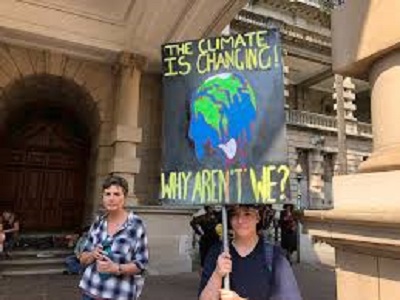South Africa: Cabinet Approves Climate Change Plans

Cabinet has recently approved three key actions that will contribute to an environment that is not only healthy for all South Africans, but one that is conducive to sustainable economic development and job creation.
During its meeting last Wednesday, Cabinet approved the Presidential Climate Change Coordinating Commission (PCCCC) to coordinate and oversee the Just Transition.
Also approved was South Africa’s Low Emissions Development Strategy (LEDS) and the revised National Waste Management Strategy 2020.
The PCCCC will be chaired by a Presidential nominee and will align South Africa’s commitment to the Nationally Determined Contribution (NDC) to contribute to the global goals on emissions reduction, adaptation and finance outlined in the Paris Agreement on Climate Change.
A preliminary budget of R50 million has been recommended for the five-year term of the Commission.
The Commission will be established through the Climate Change Bill, which is being finalised. One of its first tasks will be to focus on understanding the impact of climate change on jobs, both positive and negative, and climate change responses by sector and location.
This will require the urgent finalisation of the National Employment Vulnerability Assessment (NEVA) and thereafter, Sector Job Resilient Plans (SJRPs).
The Commission will also explore opportunities for new upstream and downstream green jobs and green industries that should be exploited, and climate resilience interventions that need to be expanded.
The Terms of Reference for the 24-member PCCCC cover the broad scope of work, including governance and proposed representation.
The overall objective is to advise and guide South Africa’s climate change response to ensure the realisation of the policy objectives of building sustainable social, economic and environmental resilience, and emergency response capacity.
It is also to ensure a fair contribution to the global effort to stabilise greenhouse gas (GHG) concentrations in the atmosphere to a level that avoids dangerous anthropogenic interference with the climate system, within a timeframe that enables economic, social and environmental development to proceed in a sustainable manner.
Mitigation strategy
South Africa’s LEDS, also approved by Cabinet, will be deposited with the United Nations Framework Convention on Climate Change (UNFCCC) Secretariat.
This is further to the country’s NDC deposited with the UNFCCC ahead of the signing of the Paris Agreement on Climate Change, in which countries commit to limit the increase in global average temperatures to below 1.5°C above pre-industrial levels.
Depositing LEDS with the UNFCCC will communicate the country’s needs and priorities, so that developed countries who want to support implementation efforts through finance, technology or capacity building are assured that South Africa has a plan to reduce its emissions.
LEDS centres on measures presently being implemented by government to address mitigation in the energy, industrial (including agriculture), forestry and land use and waste sectors.
Various strategies, policies and sector plans have been developed for individual sectors of the economy, which will all contribute to driving emission reductions.
In the long-term, sector departments will have to align, adjust, upscale and develop policies and measures to achieve Sector Emission Targets.
Waste management
The third measure approved by Cabinet is National Waste Management Strategy (NWMS) 2020, which was developed in terms of the National Environmental Management: Waste Act.
This strategy is a revision and update of the 2011 strategy, and builds on the successes and lessons from the implementation of that strategy.
NWMS 2020 is broadly focused on preventing waste and diverting waste from landfills by leveraging on the concept of the circular economy to drive sustainable, inclusive economic growth and development in the waste sector, while reducing the social and environmental impacts of waste.
Its implementation plan will create jobs in the waste sector and increase awareness and compliance around waste.
There are three overarching pillars of the revised National Waste Management Strategy 2020.
In terms of waste minimisation, the aim is to prevent waste. Where waste cannot be prevented, 40% should be diverted from landfills within five years through reuse, recycling, recovery and alternative waste treatment; 25% of waste reduction in waste generation and 20% waste reused in the economic value chain.
“Effective and sustainable waste services would see all South Africans living in clean communities with waste services that are well managed and financially sustainable.
